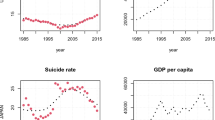Abstract
We consider the problem of estimating the transition rate matrix of a continuous-time Markov chain from a finite-duration realisation of this process. We approach this problem in an imprecise probabilistic framework, using a set of prior distributions on the unknown transition rate matrix. The resulting estimator is a set of transition rate matrices that, for reasons of conjugacy, is easy to find. To determine the hyperparameters for our set of priors, we reconsider the problem in discrete time, where we can use the well-known Imprecise Dirichlet Model. In particular, we show how the limit of the resulting discrete-time estimators is a continuous-time estimator. It corresponds to a specific choice of hyperparameters and has an exceptionally simple closed-form expression.
Access this chapter
Tax calculation will be finalised at checkout
Purchases are for personal use only
Similar content being viewed by others
Notes
- 1.
- 2.
The assumption \(d_x>0\) prevents division by zero in (3). However, \(n_{xy}\) might be zero and, if then also \(\alpha _{xy}=0\), the posterior cannot be normalised and will still be improper. Nevertheless, using an intuitive (but formally cumbersome) argument we can still identify this posterior for \(q_{xy}\) with the (discrete) distribution putting all mass at zero. Alternatively, we can motivate (3) by continuous extension from the cases where \(\alpha _{xy}>0\), similarly yielding the estimate \(\hat{q}_{xy}=0\) at \(\alpha _{xy}=n_{xy}=0\).
References
Augustin, T., Coolen, F.P.A., De Cooman, G., Troffaes, M.C.M. (eds.): Introduction to Imprecise Probabilities. Wiley, Hoboken (2014)
Berger, J.O.: Statistical Decision Theory and Bayesian Analysis. Springer, Heidelberg (1985)
Bladt, M., Sørensen, M.: Statistical inference for discretely observed Markov jump processes. J. R. Stat. Soc.: Series B (Stat. Methodol.) 67(3), 395–410 (2005)
De Cooman, G., De Bock, J., Diniz, M.A.: Coherent predictive inference under exchangeability with imprecise probabilities. J. Artif. Intell. Res. 52, 1–95 (2015)
De Bock, J.: The limit behaviour of imprecise continuous-time Markov chains. J. Nonlinear Sci. 27(1), 159–196 (2017)
Erreygers, A., De Bock, J.: Imprecise continuous-time Markov chains: efficient computational methods with guaranteed error bounds. In: Proceedings of ISIPTA 2017, pp. 145–156 (2017)
Inamura, Y.: Estimating continuous time transition matrices from discretely observed data. Bank of Japan (2006)
Krak, T., De Bock, J., Siebes, A.: Imprecise continuous-time Markov chains. Int. J. Approx. Reason. 88, 452–528 (2017)
Norris, J.R.: Markov Chains. Cambridge University Press, Cambridge (1998)
Quaeghebeur, E.: Learning from samples using coherent lower previsions. Ph.D. thesis
Quaehebeur, E., De Cooman, G.: Imprecise probability models for inference in exponential families. In: Proceedings of ISIPTA 2005 (2005)
Rockafellar, T.R., Wets, R.J.B.: Variational Analysis. Springer, Heidelberg (1997)
Škulj, D.: Efficient computation of the bounds of continuous time imprecise Markov chains. Appl. Math. Comput. 250(C), 165–180 (2015)
Walley, P.: Statistical Reasoning with Imprecise Probabilities. Chapman and Hall, London (1991)
Walley, P.: Inferences from multinomial data: learning about a bag of marbles. J. R. Stat. Soc. Ser. B 58, 3–57 (1996)
Acknowledgements
The work in this paper was partially supported by H2020-MSCA-ITN-2016 UTOPIAE, grant agreement 722734. The authors wish to thank two anonymous reviewers for their helpful comments and suggestions.
Author information
Authors and Affiliations
Corresponding author
Editor information
Editors and Affiliations
Rights and permissions
Copyright information
© 2019 Springer Nature Switzerland AG
About this paper
Cite this paper
Krak, T., Erreygers, A., De Bock, J. (2019). An Imprecise Probabilistic Estimator for the Transition Rate Matrix of a Continuous-Time Markov Chain. In: Destercke, S., Denoeux, T., Gil, M., Grzegorzewski, P., Hryniewicz, O. (eds) Uncertainty Modelling in Data Science. SMPS 2018. Advances in Intelligent Systems and Computing, vol 832. Springer, Cham. https://doi.org/10.1007/978-3-319-97547-4_17
Download citation
DOI: https://doi.org/10.1007/978-3-319-97547-4_17
Published:
Publisher Name: Springer, Cham
Print ISBN: 978-3-319-97546-7
Online ISBN: 978-3-319-97547-4
eBook Packages: Intelligent Technologies and RoboticsIntelligent Technologies and Robotics (R0)




